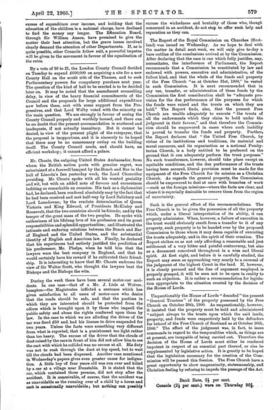The Report of the Royal Commission on Churches (Scot- land)
was issued on Wednesday. As we hope to deal with the matter in detail next week, we will only give to-day a bare outline of the conclusions arrived at by the Commission. After declaring that the case is one which fully justifies, nay, necessitates, the interference of Parliament, the Report recommends that a Commission be constituted by law and endowed with powers, executive and administrative, of the fullest kind, and that the whole of the funds and property of the Free Church "as at October 31st, 1900," be vested in such Commission. It is next recommended that in any use, transfer, or administration of these funds by the Commission the first consideration shall be "adequate pro- vision for the due performance of the purposes for which the funds were raised and the trusts on which they are held." The Report finds, also, that the present Free Church are unable adequately to execute "the trusts of all the endowments which they claim to hold under the judgment in their favour," and that therefore the Commis- sion should be empowered in cases where such inability is proved to transfer the funds and property. Further, the Report declares that "the United Free Church, by virtue of its institutions and traditions, its material and moral resources, and its organisation as a national Presby- terian Church, is a body entitled to be preferred on the ground that it can adequately perform the trust purposes." No such transference, however, should take place except on equitable conditions, and the due performance of the trusts having been secured, liberal provision must be made for the equipment of the Free Church for its mission as a Christian Church. As regards the general property, the Commission should be empowered to deal at once with branches of work —such as the foreign missions—where the facts are clear, and where it is especially desirable to remove them from the region of uncertainty.


































 Previous page
Previous page